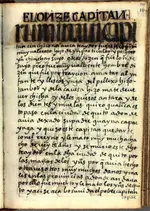QUOTE=markmar;3189599]Crow
You wrote " In 1615 inca people saw Ruminavi as a traitor not hero as he is seen as today " .
The book " Guaman Poma " is writen by a Spanish , who wrote how Ruminavi was an traitor . The Inca never wrote something like this .
The conclusion is how the book is a propaganda for that era . It wanted to put Inca against theirs leaders , and one of these , for revenge , to tell them where is the trasure .
Marius[/QUOTE]
Hello Marius
I beg to differ my friend as clearly you have no understanding of who Guaman Poma was?
Felipe Guaman Poma de Ayala born about 1535 and died about or after 1615? also known as Guamán Poma or Huamán Poma, was a Quechua noble man known for his chronicle in which he denounced the ill treatment of the native peoples of the Andes by the Spanish after conquest Today, Guaman Poma is noted for his illustrated chronicle, Nueva Corónica y Buen Gobierno. The pages posted above was from the chapter of Inca captains.
Let me be clear on some thing Felipe Guaman Poma de Ayala was no puppet for Spanish propoganda.
The son of a noble Inca family from the central Southern Peruvian province of Lucanas located in the modern day department of Ayacucho. He was direct descendent of the eminent indigenous conqueror and ruler Huaman-Chava-Ayauca Yarovilca-Huanuco. Felipe Guaman Poma de Ayala was a fluent speaker of several Quechua and Aru dialects, who probably learned the Spanish language as a child or adolescent. He went on to become literate in the language, although did not achieve a perfect grasp of Spanish grammar. That my learned friend Don Jose so quickly picked up when he read the manuscipt.
So you see if the document was written by a Spainish writer the the grammar would of been better. And it would not have have told of all the Spanish atrocities that was happening in the country now would it?
There is a handful of sixteenth-century documents attest that Guaman Poma served in the 1560s-70s as a Quechua translator for Fray Cristóbal de Albornozin his campaign to eradicate the messianic apostasy, known as Taqui Onoqoy, from Christian doctrine of local believers.
Guaman Poma appeared as a plaintiff in a series of lawsuits from the late 1590s, in which he attempted to recover land and political title in the Chupas valley that he believed to be his by family right. These suits ultimately proved disastrous for him; not only did he lose the suits, but in 1600 he was stripped of all his property and forced into exile from the towns which he had once ruled as a noble.
Guaman Poma's great work was the "El primer nueva corónica y buen gobierno" meaning in English "The First New Chronicle and Good Government", is a 1,189-page document. His book remains the longest sustained critique of Spanish colonial rule produced by an indigenous subject in the entire colonial period. Written between 1600 and 1615 and was addressed to King Philip III of Spain.
The manuscript outlines the injustices of colonial rule and argues that the Spanish were foreign settlers in Peru. "It is our country," he said, "because God has given it to us." Clearly if Felipe Guaman Poma de Ayala as a Inca noble claimed that Ruminavi as a traitor then clearly that it was the belief back then by most Incas that Ruminavi had betrayed Sapa Inca Atahualpa.
There was much more greater deserving Inca heros than Ruminavi. And the book was not proganda for the Spanish.
Crow




